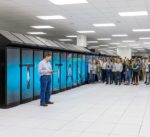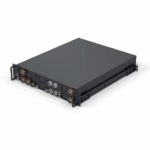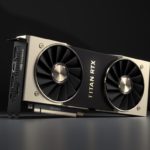SK Telecom of South Korea has boosted the power of its “Titan” AI supercomputer by roughly 100 percent by increasing its capacity to 1,040 NVIDIA A100 GPUs A story on the Korean news site Pulse stated that SKT announced on Sunday the news on the supercomputer, which powers of the company’s artificial intelligence model, called […]
Search Results for: TITAN
SK Telecom Doubles Capacity of ‘Titan’ Supercomputer for ChatGPT-like Language Model
Mellanox to Acquire Titan IC for Security and Data Analytics
Today Mellanox announced that it has reached a definitive agreement to acquire privately held Titan IC, the leading developer of network intelligence (NI) and security technology to accelerate search and big data analytics across a broad range of applications in data centers worldwide. The acquisition will further strengthen Mellanox’s network intelligence capabilities delivered through the […]
How the Titan Supercomputer was Recycled
In this special guest feature, Coury Turczyn from ORNL tells the untold story of what happens to high end supercomputers like Titan after they have been decommissioned. “Thankfully, it did not include a trip to the landfill. Instead, Titan was carefully removed, trucked across the country to one of the largest IT asset conversion companies in the world, and disassembled for recycling in compliance with the international Responsible Recycling (R2) Standard. This huge undertaking required diligent planning and execution by ORNL, Cray (a Hewlett Packard Enterprise company), and Regency Technologies.”
GMS Launches Ruggedized TITAN AI-Equipped Rackmount Servers
Today General Micro Systems (GMS) launched TITAN, the industry’s first sealed, fanless, conduction-cooled rackmount servers with artificial intelligence (AI) and mil-circular (38999) connectors for superior ruggedness in the most demanding defense and aerospace applications. The American-designed, sourced, and manufactured TITAN, a fully configurable server, also uses up to four of Intel’s latest 2nd gen Scalable […]
NVIDIA Unveils TITAN RTX GPU for Accelerated Ai
Today NVIDIA introduced the TITAN RTX as what the company calls “the world’s most powerful desktop GPU” for AI research, data science and creative applications. “Driven by the new NVIDIA Turing architecture, TITAN RTX — dubbed T-Rex — delivers 130 teraflops of deep learning performance and 11 GigaRays of ray-tracing performance. Turing is NVIDIA’s biggest advance in a decade – fusing shaders, ray tracing, and deep learning to reinvent the GPU,” said Jensen Huang, founder and CEO of NVIDIA. “The introduction of T-Rex puts Turing within reach of millions of the most demanding PC users — developers, scientists and content creators.”
Using the Titan Supercomputer to Develop 50,000 Years of Flood Risk Scenarios
Dag Lohmann from KatRisk gave this talk at the HPC User Forum in Tucson. “In 2012, a small Berkeley, California, startup called KatRisk set out to improve the quality of worldwide flood risk maps. The team wanted to create large-scale, high-resolution maps to help insurance companies evaluate flood risk on the scale of city blocks and buildings, something that had never been done. Through the OLCF’s industrial partnership program, KatRisk received 5 million processor hours on Titan.”
Using the Titan Supercomputer to Accelerate Deep Learning Networks
A team of researchers from the Department of Energy’s Oak Ridge National Laboratory has married artificial intelligence and high-performance computing to achieve a peak speed of 20 petaflops in the generation and training of deep learning networks on the laboratory’s Titan supercomputer.
Adapting Deep Learning to New Data Using ORNL’s Titan Supercomputer
Travis Johnston from ORNL gave this talk at SC17. “Multi-node evolutionary neural networks for deep learning (MENNDL) is an evolutionary approach to performing this search. MENNDL is capable of evolving not only the numeric hyper-parameters, but is also capable of evolving the arrangement of layers within the network. The second approach is implemented using Apache Spark at scale on Titan. The technique we present is an improvement over hyper-parameter sweeps because we don’t require assumptions about independence of parameters and is more computationally feasible than grid-search.”
Radio Free HPC Looks at the New Power9, Titan V, and Snapdragon 845
In this podcast, Radio Free HPC Looks at the New Power9, Titan V, and Snapdragon 845 devices for AI and HPC. “Built specifically for compute-intensive AI workloads, the new POWER9 systems are capable of improving the training times of deep learning frameworks by nearly 4x allowing enterprises to build more accurate AI applications, faster.”













